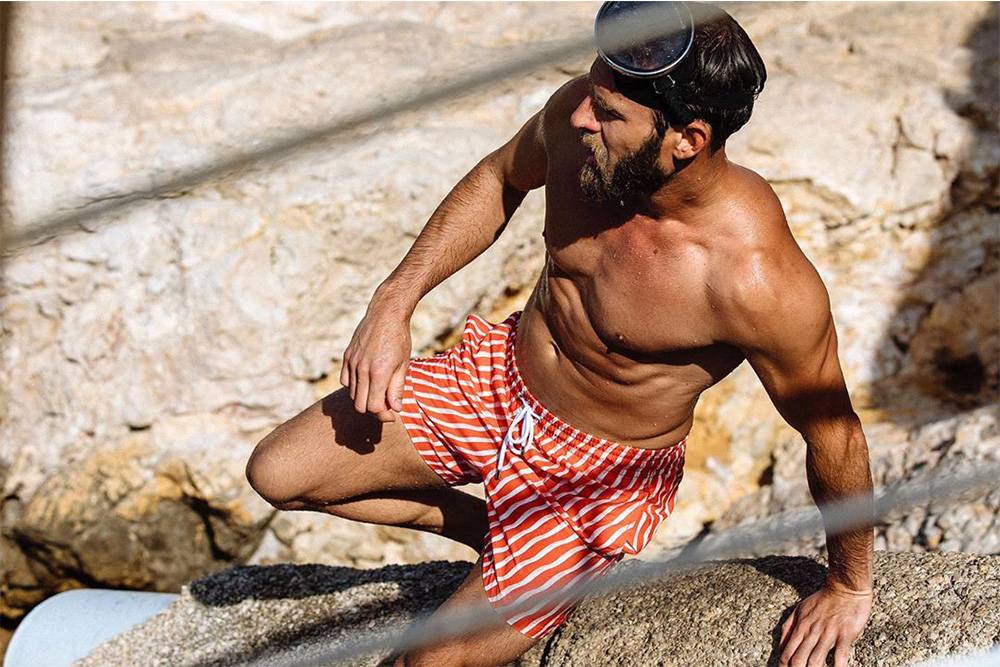
The sustainable swimwear brand Apnée is launching its first complete collection made of ocean trash, including recycled swimshorts produced in Portugal.
Two passionate French divers founded the Apnée swimwear brand in 2017 after seeing how ocean pollution was getting worse every year. They created a first capsule collection in 2019 and are now launching a complete collection of men's swimwear.
They help make the fashion industry more eco-responsible by transforming ocean waste into new fabrics used to make swimwear. They hope to change our social and environmental impact in the long term.
"As passionate entrepreneurs and fervent sea lovers, we wanted to create a brand that would reflect our passions and convictions. [...] Our profound love for the abyssal depths has influenced our message and approach. Beyond offering timeless products at a fair price, it is now also important for us that our products become more responsible and committed to a cause. Hence, the ecology and the protection of our oceans is now one of the main concerns of our brand."
Apnée has partnered with Seaqual, a Spanish initiative and collaborative community of individuals, organizations, and companies that help clean our oceans, raise awareness of the issue of marine plastic and highlight the heroes who are working to solve it.
The Seaqual initiative is dedicated to giving a new life to all types of marine plastic. Its transformation of marine plastic takes place in Europe after being retrieved by ocean clean-ups in Europe, the Mediterranean and the west coast of Africa.
Brands and manufacturers from 46 countries have already joined Seaqual to fight against marine litter. In the future, they plan to transform locally retrieved marine litter from local organizations at strategic locations around the world, starting with Asia and Central and North America.

Every year, global plastic production reaches more than 300 million tons, as reported by the International Union for Conservation of Nature (IUCN). And 8 million tons of plastic are dumped into the ocean. Less than 10% of all plastic is recycled.
Plastic waste has a disastrous impact on the environment, particularly in the ocean. It pollutes water and entire food chains, threatening human health, wildlife, and the planet.
Plastics can survive in the ocean for hundreds of years, although UV rays, saltwater, and friction make them degrade quicker.
The equivalent of one garbage truck of plastic is leaking into our oceans every minute of every day of the year, according to the report The New Plastic Economy by the Ellen MacArthur Foundation, World Economic Forum, and McKinsey.
Drinking polluted water and eating seafood contaminated by plastics exposes people to harmful pollutants. Workers in garment factories, wastewater treatment facilities, cruise ships, and fish farming industries are particularly endangered.
Apnée designs printed swim shorts with a sustainable process based on three criteria: quality, durability, and respect for the environment.
Collected plastic waste from the ocean creates regenerated polyester fabrics, which are then printed in an environmentally friendly manner using digital sublimation.
Discover Apnée sustainable swimwear at apneeswimwear.com.
Was this article helpful to you? Please tell us what you liked or didn't like in the comments below.
About the Author: Alex Assoune
What We're Up Against
Multinational corporations overproducing cheap products in the poorest countries.
Huge factories with sweatshop-like conditions underpaying workers.
Media conglomerates promoting unethical, unsustainable products.
Bad actors encouraging overconsumption through oblivious behavior.
- - - -
Thankfully, we've got our supporters, including you.
Panaprium is funded by readers like you who want to join us in our mission to make the world entirely sustainable.
If you can, please support us on a monthly basis. It takes less than a minute to set up, and you will be making a big impact every single month. Thank you.































0 comments